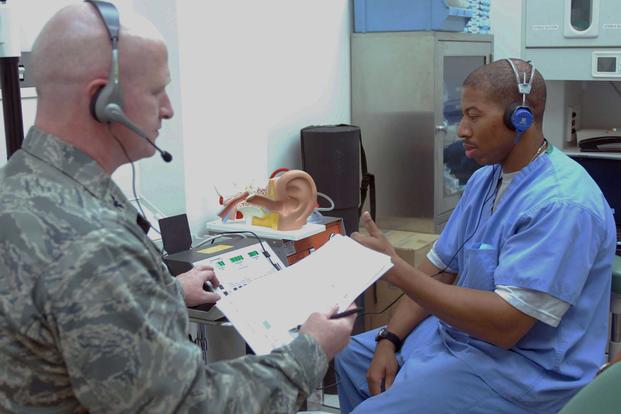The Department of Veterans Affairs will change its disability ratings criteria for mental health conditions, sleep apnea and tinnitus, part of a major overhaul of the review process to ensure that compensation matches veterans' medical conditions and needs, department officials say.
The VA plans to update its Schedule for Rating Disabilities -- its guide for determining how it evaluates and provides benefits for service-connected disabilities -- for mental health conditions, to include their impact on veterans' lives, and abolish the "0%" disability rating for any service-connected mental health diagnosis in favor of a 10% minimum, according to a notice published Tuesday in the Federal Register.
For tinnitus, the department will get rid of its stand-alone rating and consider the condition a symptom of whatever underlying disease is its cause.
Read Next: Defense Secretary Austin Heads to Europe as Putin Readies Ukraine Invasion Force
As for sleep apnea, ratings will be assessed based on the effectiveness of treatment and the condition's impact on "earning impairment," according to the notice.
Previously, most conditions were assessed on the number and severity of symptoms, but VA officials said the consideration of lost wages or productivity is needed to ensure that the department compensates veterans appropriately.
Officials say the changes, which would go into effect after a period for the public to comment and a final version is published, likely will result in higher disability ratings for veterans with mental health conditions, but fewer qualifying for disability compensation for tinnitus and sleep apnea.
Veterans already receiving disability for these conditions will not see their ratings downgraded by any changes, officials said.
"Veterans who currently receive compensation for a service-connected condition in these body systems will not have their disability rating impacted when the VA Schedule for Rating Disabilities is updated," Thomas Murphy, acting VA undersecretary for benefits, said in a press release.
Assessing disabilities by the impact they have on earning capacity will allow the department to "more accurately compensate [veterans] for their service-connected disabilities, officials said in the Tuesday press release.
"Updating the rating schedule allows veterans to receive decisions based on the most current medical knowledge relating to their condition," Murphy said.
Under the proposal for mental health conditions, the VA will consider a condition's impact on cognition, relationships and ability to complete tasks, care for oneself and perform activities necessary for functioning daily.
Citing studies that showed the current VA disability rating system does not adequately provide compensation to make up for earnings lost if a veteran misses work or can't work as the result of a service-related mental health condition, the department plans to adopt the new criteria to "more accurately capture the occupational impairment caused by mental disabilities and provide more adequate compensation," according to the notice.
The new criteria also will be used to assess disability ratings for eating disorders, which currently are outlined in a separate part of the disability ratings schedule.
Officials said an overhaul of the system is underway because the disability ratings evaluation schedule has been updated piecemeal since it was first created in 1945.
To date, the VA has completed updating 10 of the 14 sections of the schedule; the proposed changes to mental health and the section that covers tinnitus and sleep apnea make up half of the remaining.
VA officials said the changes made to the criteria reflect modern medicine and a better understanding of how diagnoses and treatments affect veterans' lives.
Speaking with reporters during a press conference Monday, a VA benefits official noted that when overhauling the section on musculoskeletal injuries, the department shortened the time period for veterans to receive disability payments following a hip replacement from 12 months to four.
"We looked at more recent medical studies ... and found that the time somebody is off of work after having that surgery is closer to three months ... so we made a revision to that portion," the official said.
The VA is seeking public comment on the proposed changes to the ratings schedule through the Federal Register. After the comment period closes April 18, the department will review them and draft a final version, to include the dates the changes will go into effect.
Once the changes are made, veterans who believe their ratings should be upgraded based on the new criteria should file a claim, the official said.
"We anticipate seeing higher evaluations for mental health conditions," the official said.
-- Patricia Kime can be reached at Patricia.Kime@Monster.com. Follow her on Twitter @patriciakime
Related: VA Wants to Waive Some Copays for Vets at High Risk for Suicide













